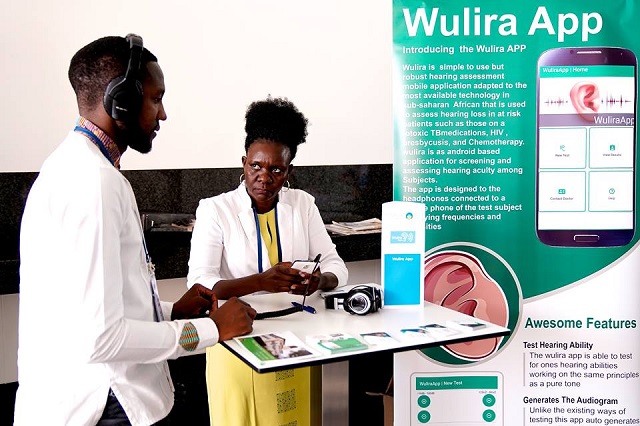
Kampala, Uganda | THE INDEPENDENT | Persons threatened with hearing loss can now be diagnosed earlier thanks to a smartphone based audiometry app named Wulira.
The application which works just like the pure tone audiometer, the recommended equipment by the World Health Organisation requires the user to have a mobile phone and earphones or headsets. It is a brainchild of Makerere University-based researcher Dr Charles Batte.
It comes at a backdrop of reports that a lot of people battling hearing loss remain undiagnosed yet those that end up in hospital are diagnosed very late. This according to the Uganda Medical and Dental Practitioners’ Council is a result of the fewer numbers of Ear, Nose and Throat specialists in the country.
Uganda has only 49 Ear, Nose and Throat (ENT) medical specialists against a population of 44 million people. This implies that for many Ugandans to be able to consult an ENT specialist, they have to either pay for private care or go to a regional or national referral facility.
But after completing clinical trials for the app and having it peer-reviewed and finally published in the medical Journal of the Pan African Thoracic Society, Batte says the innovation embarked on in 2018 can now be used by health workers to detect hearing loss as it has shown in studies to give over 90 percent efficacy.
During clinical trials, they tested the app on 120 patients who were receiving anti-tuberculosis treatment at Makerere University Lung Institute and had reported challenges in hearing as one of the drugs side effects. They tested them using both the pure tune audiometer which is the gold standard and the app.
The app has a dashboard that has frequencies of different sounds that are used to analyze one’s hearing ability depending on how they react every time the sound on Wulira app is played.
Batte adds that the app plots the sound and the results can be sent by a lower cadre health worker to a specialist for interpretation where necessary or rated with the World Health Organization’s guidelines for one to be considered as having hearing problems.
He says while the app was initially tested on TB patients, it can be used for testing all people including those whose hearing loss is due to other reasons such as factory workers or those that listen to very loud music.
However, while hospital diagnosis is supposed to be done in soundproof room, Batte says with careful blocking of sources of noise, the app can be used for self-testing with guidelines that they are yet to be set. He said initially, they had designed it for use by medical workers but with recommendations from other researchers, they plan to make it more user friendly for laypeople to do self-testing.
In terms of statistics, the Ministry of Health said that in March as Uganda marked World Hearing Day that over two million Ugandans suffer from a form of hearing loss but many of them including children go undiagnosed.
According to Dr Fred Bisso, an ENT consultant, detecting ear problems requires paying attention as many present without symptoms. For each patient he said, a specialist will take not less than three hours if they are to thoroughly examine them.
But he says this doesn’t happen in many facilities because doctors have to see many patients in a short time. As a result he says, some end up misdiagnosing patients making conditions that would have been solved by simple antibiotics deteriorate into requiring surgery or use of hearing aids.
He says this is worsened by the fact that in absence of ENT specialists, the government has been hesitant to recruit ENT diploma holders even as many of them have recently trained. In the absence of these, an easy to operate app comes in handy. Already at Mulago National Referral hospital, some doctors have started using the app according to Batte.
******
URN
 The Independent Uganda: You get the Truth we Pay the Price
The Independent Uganda: You get the Truth we Pay the Price




Awesome information which you provide to all of us.
Best ENT Clinic in Hyderabad.
Do visit to our website for more infromation and specialities.